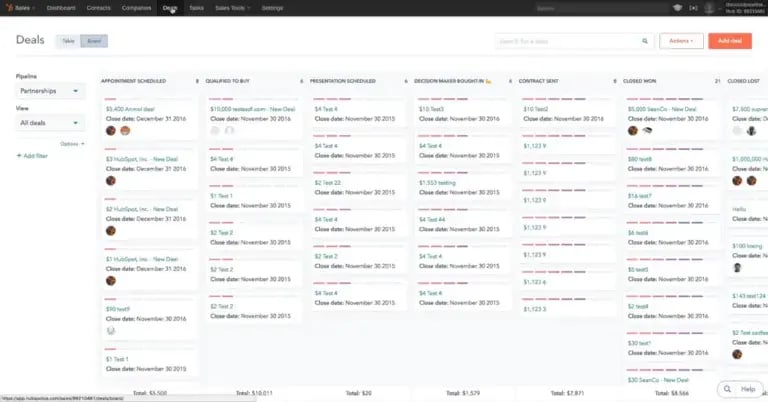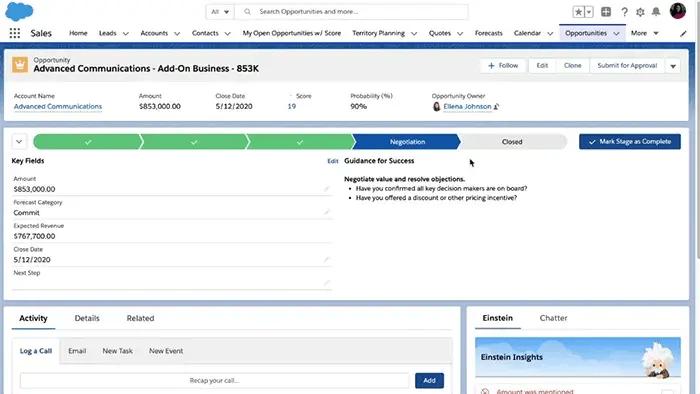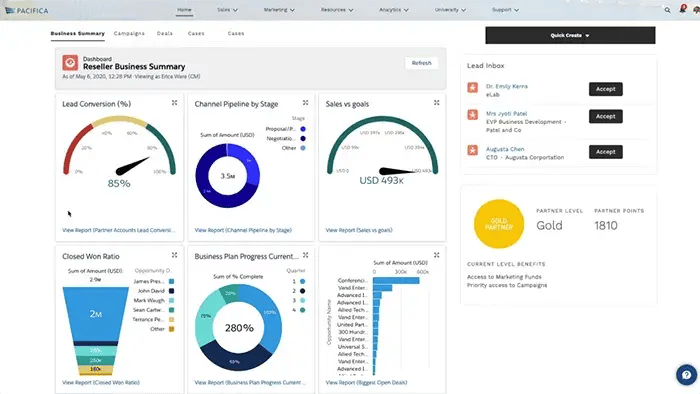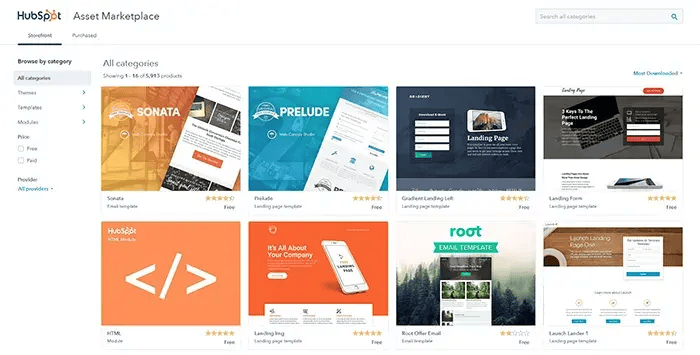HubSpot vs. Salesforce
Although there are many different types of CRMs, with new CRMs being added each day, HubSpot and Salesforce consistently rank among the highest-rated and most popular options. Today we will be comparing the two CRMS based on functionality, user experience, scalability, third-party integrations to help decision-makers choose the most appropriate solution for their business needs.
Salesforce vs. HubSpot: An Overview
What is HubSpot?
Founded in 2006, HubSpot is a software development and marketing company best known for its flagship CRM platform of the same name. The HubSpot software suite includes the free HubSpot CRM, CMS Hub for content management, Marketing Hub for lead generation and marketing automation, Sales Hub for sales analytics and automation, and Service Hub for offering customer service.
The Free HubSpot CRM is currently targeted towards small teams or individuals. For larger, enterprise-level businesses, Sales Hub offers a more feature-rich CRM solution. Sales Hub includes sales engagement software, deep analytics tools, CPQ (Configure, Price, Quote) tools, and other features that empower large sales teams to close deals while saving time and money.
What is Salesforce?
Salesforce was founded in 1999, offering CRM software that featured products centered around marketing, customer service, automation, and analytics. It is one of the most popular CRMs around the world, used by major companies including Adidas, Unilever, BBVA, T-Mobile, AWS, and much more.
Salesforce Cloud Enterprise is an all-in-one platform that houses the entire Salesforce suite of apps, allowing companies to view and evaluate each step of the customer journey. The CRM is now also enhanced by Sales Cloud Einstein, a powerful artificial intelligence that analyzes overall business performance, reduces inefficiencies, and presents new trends and insights using analytics.
Feature Comparison
Functionality
HubSpot brings together the capabilities of an enterprise-level platform with a user-friendly design. Sales Hub offers a powerful suite of tools that simplify email outreach, automated follow-ups, connecting with prospects, and tracking a business’s overall sales funnel. The platform is fully-featured and intuitively designed to ensure teams focus on producing sales, instead of the monotonous tasks around sales.

Salesforce also delivers a state-of-the-art platform for an enterprise’s sales needs. This includes advanced tools for managing contacts, automating sales, and analyzing an entire pipeline. Easily view a business’s performance at a glance through dashboards, view markets through Salesforce Maps, and adjust a sales process with ease. Sales Cloud allows decision makers to develop more informed sales strategies.

User Experience
HubSpot has received high praise for its user-friendly software, even earning a mention in PCMag’s The Best CRM Software for 2020 as “best for easy to use CRM for SMBs”. HubSpot’s whole platform has a colorful but minimalist design, using terminology that newcomers can easily understand. HubSpot has been rapidly adopted in recent years due to its ease-of-use and the additional context it lends each transaction. In HubSpot’s own words, “HubSpot’s CRM works for the sales rep, not against the sales rep.”
Salesforce’s platform looks modern and sleek yet simple and intuitive. Where Salesforce’s design truly shines is in its dashboards— leaders can have multiple dashboards, all fully customizable, and each assigned to a unique data set. Keep track of sales activity, big deals and neglected leads, monitor a news feed, send and receive notes from other users, and much more— all in one centralized location.

Scaling
HubSpot focuses on easy-to-understand design and vocabulary to create a smooth learning curve for newcomers and marketing experts alike. The Free HubSpot CRM is a practical starting point for aspiring marketers, while the enterprise-level plans offer advanced features and tools, such as personalized outreach, custom reporting, user roles with field-level permissions, and more.
Salesforce was originally created with enterprises in mind and has gradually evolved to cater to small businesses as well. Salesforce Essentials, their most basic plan, offers sales and marketing for up to 10 users, including guided onboarding, lead scoring, email and event tracking, custom reports and dashboards, and even mobile access. But their Lightning Enterprise plan remains the most popular plan— for $150 per user per month (annually), companies have access to workflow automation, report history tracking, custom app development, and access to the web services API. Salesforce Lightning Enterprise remains a favorite for many corporations.
Marketplaces
HubSpot offers a wide range of apps that fully-integrate with Gmail, Outlook, WordPress, YouTube, Facebook, Mailchimp, and more, all developed and designed in-house. The integrations work seamlessly— the Gmail app, for example, allows HubSpot to integrate directly within the Gmail website, offering email open and click tracking, templates, meeting scheduling, and other shortcuts. The marketplace has over 500 apps and integrations.

Salesforce’s AppExchange holds the record for the largest CRM marketplace. Currently, there are over 3,400 apps and integrations available on AppExchange, with an app for just about any scenario— collecting customer feedback with SurveyMonkey, managing a contract pipeline with DocuSign, and even comprehensive SMS system integration with 360 SMS.
Awards and Reviews
HubSpot’s has been awarded by G2 as a “Crowd Leader in Marketing Automation, Web Content Management, CRM, and More”, Gartner Peer Insights gave it the “Customer’s Choice for CRM Lead Management in 2020”, and PC Magazine named it “Best Marketing Automation Software & Best Email Software”. The platform has received a 4.5 rating based on 5,629 reviews on G2.
Salesforce too has received its fair share of awards, repeatedly being awarded best Enterprise CRM and Mid-Market CRM for 6 consecutive years by CRM Magazine. They have also been awarded as the Top-Rated CRM on the G2 Crowd Grid, positioned as a “Leader” in Gartner’s CRM Customer Engagement Center Magic Quadrant for four consecutive years, and is the #1 recommended CRM by Software Advice. They have been used by major companies such as ADP, State Farm, Aldo, and Toyota, to name a few.
Pricing
Ultimately, companies need to weigh how much a piece of software truly costs versus the advantages the business can gain. The retail or listed price isn’t enough either— often times there are additional expenses involved in the setup or transition to the CRM. Here is a pricing breakdown of the two competing CRM products.
| HubSpot Sales Hub Enterprise | Salesforce Cloud Enterprise | |
| List Price | $1,200/month (billed annually, 10 users included, $150/month for each additional user ) | $150/month (billed annually, per user) |
| Onboarding | $3,000 flat rate | $5,000 flat rate, may vary by location. |
| Customer Support | Phone and email support included for all Enterprise plans. | 20% of net price, includes “24/7 phone support, 1-to-1 coaching, developer help, and proactive engagements.” |
| Outbound Calling | Included in all plans (limited to 2,000 minutes/user/month for Enterprise). May vary by location. | $25/user/month (billed annually) |
| Sales Engagement Software | Included with Enterprise | $25/user/month |
Final Verdict
Both HubSpot and Salesforce have developed CRM platforms that remain unrivaled within their industry. They both have feature-rich software with intuitive interfaces, powerful sales and marketing tools, third-party integrations, helpful communities and knowledge bases, and robust technical support service.
HubSpot is a powerful platform that gives entrepreneurs, startups, and small business owners the technology and insight of a full enterprise with a comprehensive all-in-one sales and marketing suite at a highly competitive rate. The ease of use, flexible integrations, and vibrant community make compelling reasons to choose the HubSpot CRM.
Comparatively, Salesforce has a bigger reputation as an enterprise CRM, having dominated the industry for over two decades. Salesforce’s platform continues to be the deepest, smartest, and most versatile CRM offering in 2020. Smaller teams may require CRM experts or full-time admins to use the software to its potential, but maximized properly, and it can bring a company richer insights and greater efficiencies.
Which one is right for your business? The answer depends on your audience, your needs, and your industry. To discuss which may be best for your business, consult Arcalea today.





RESPONSES